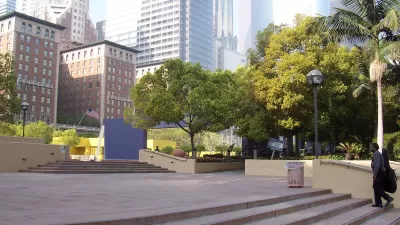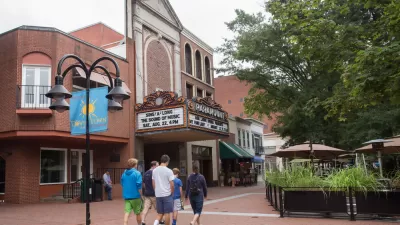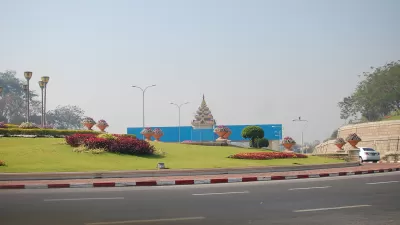Freeway overpasses instead of town squares are now often selected as the preferred public space to promote a non-commercial point of view, but such messaging does little to enhance public discourse, writes planner and urbanist Howard Blackson.
Towns used to be built around public squares, which became the center and podium for all manner of public discourse. Later, buildings came first and public space became an after-thought. Worse yet, now freeway overpasses rather than public squares or plazas are often selected as the place to protest and pontificate about a political or social belief. Planner, urbanist, and Leon Krier disciple, Howard Blackson writes about this less obvious loss to an auto-oriented lifestyle:
Our failure to cultivate the value and quality of our public spaces and public life is found in this picture of protesters and political advocates on a freeway overpass. Our cities are made up of public buildings, streets, squares and private lots, blocks and buildings. But when people want to be heard, seen, and get their message out to as many people as possible, they now gather on freeway bridge overpasses… for its on the freeways where everyone else can be found today, and not on our public street corners and squares.
Blackson goes on to point out how freeway overpasses are not the equals of urban public spaces:
When I see people expressing their views on freeway overpasses, I see our civilization under duress or at least in transition – from gathering in the square to holding signs on an overpass bridge. These are one-way statements and this type of conversation does not facilitate a dialog and understanding. Sadly, this illustrates how far we’ve receded from what urban design guru Leon Krier teaches, “The architecture of the city and public space is a matter of common concern to the same degree as laws and language – they are the foundation of civility and civilization.”
For more of Blackson's thoughts on this topic, see the source article.
FULL STORY: Overpassing the value of public space

Maui's Vacation Rental Debate Turns Ugly
Verbal attacks, misinformation campaigns and fistfights plague a high-stakes debate to convert thousands of vacation rentals into long-term housing.

Planetizen Federal Action Tracker
A weekly monitor of how Trump’s orders and actions are impacting planners and planning in America.

In Urban Planning, AI Prompting Could be the New Design Thinking
Creativity has long been key to great urban design. What if we see AI as our new creative partner?

Massachusetts Budget Helps Close MBTA Budget Gap
The budget signed by Gov. Maura Healey includes $470 million in MBTA funding for the next fiscal year.

Milwaukee Launches Vision Zero Plan
Seven years after the city signed its Complete Streets Policy, the city is doubling down on its efforts to eliminate traffic deaths.

Portland Raises Parking Fees to Pay for Street Maintenance
The city is struggling to bridge a massive budget gap at the Bureau of Transportation, which largely depleted its reserves during the Civd-19 pandemic.
Urban Design for Planners 1: Software Tools
This six-course series explores essential urban design concepts using open source software and equips planners with the tools they need to participate fully in the urban design process.
Planning for Universal Design
Learn the tools for implementing Universal Design in planning regulations.
Gallatin County Department of Planning & Community Development
Heyer Gruel & Associates PA
JM Goldson LLC
City of Camden Redevelopment Agency
City of Astoria
Transportation Research & Education Center (TREC) at Portland State University
Jefferson Parish Government
Camden Redevelopment Agency
City of Claremont





























